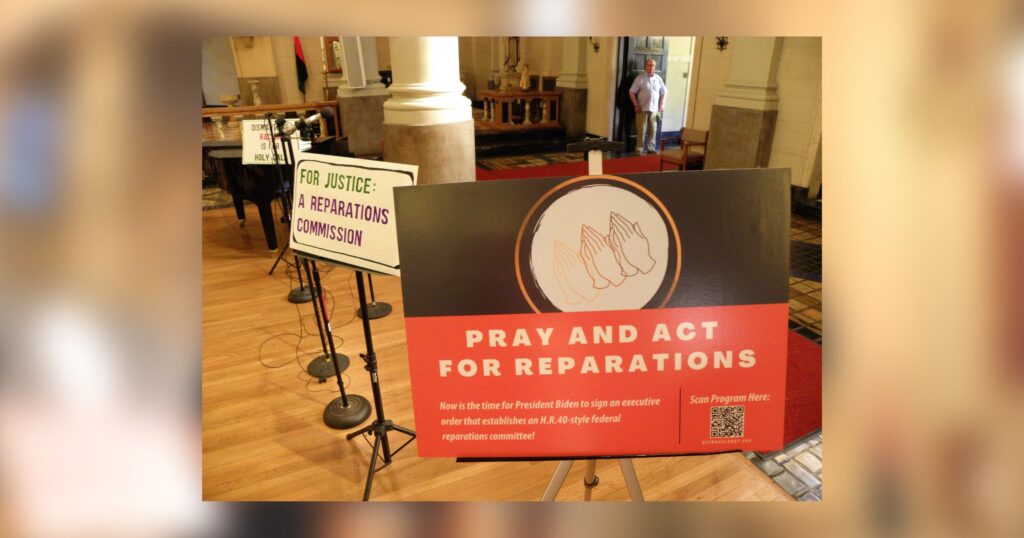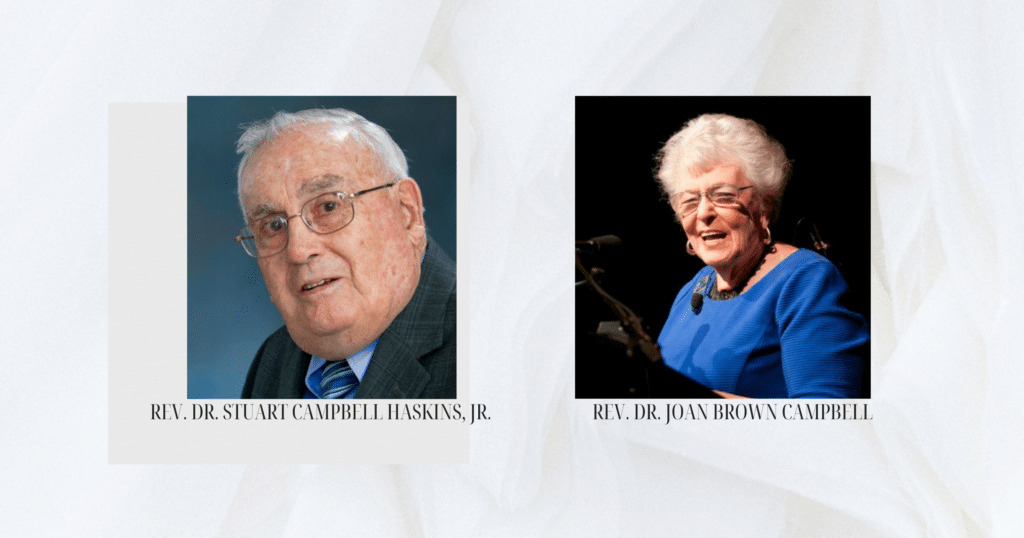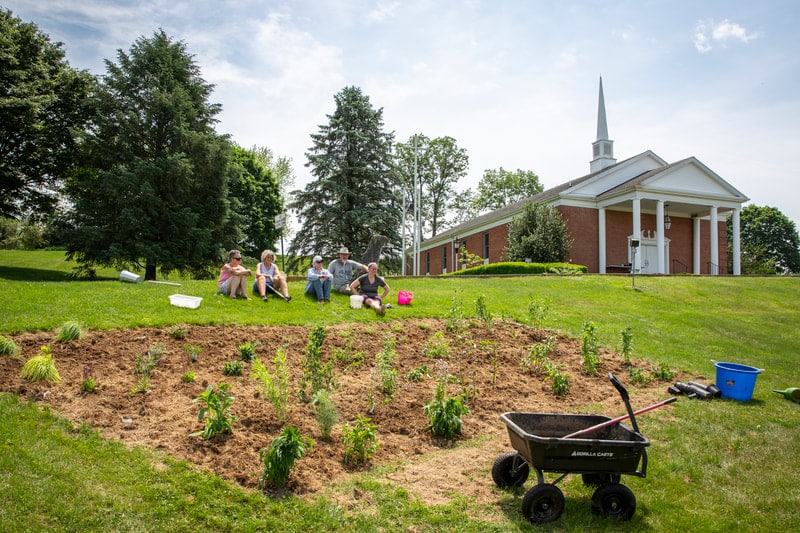UCC among faith groups pushing Biden to form reparations commission
A coalition of religious activists wants to build on the U.S. Juneteenth holiday.
This year, only the second marking Juneteenth as an official holiday, its members are urging President Joe Biden to take an action that will focus more sharply on legacies of slavery and racism.
From jointly signed letters to Biden to a June 15 vigil at a Cleveland church to a June 16 news conference near the White House, the faith groups — and secular partners — are pushing Biden to use his power. They want him to issue an executive order to explore reparations.
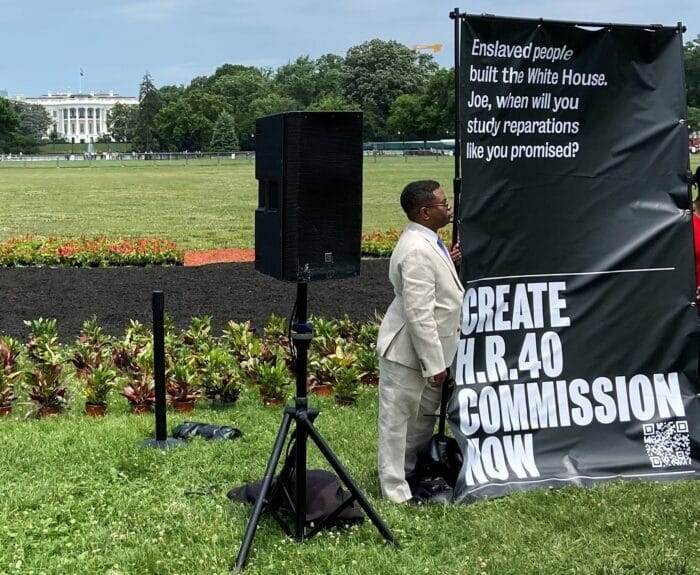
The order would create an “expert commission” like the one called for in a bill languishing in the U.S. House of Representatives. H.R. 40, the “Commission to Study and Develop Reparation Proposals for African-Americans Act,” was introduced more than a year ago.
“Juneteenth as a federal holiday is not reparations,” said the Rev. Marvin Silver, associate Conference minister of the United Church of Christ’s Central Atlantic Conference, who attended the D.C. news conference. “President Biden needs to go further and act now on this demand. A commission to study is a critical next step on the pathway towards reparations for people of African descent in this country.
“In this highly charged, tense political environment and hate-filled culture, today’s event is a bold statement in the long fight to to ‘let justice roll.'”
‘A fair chance’
Calling themselves the “Why We Can’t Wait Coalition,” the activists say they’re holding Biden to his campaign promises to “support a study of the continuing impacts of slavery” and “a study of reparations.”
They include such diverse groups as the National Coalition of Blacks for Reparations in America, Color of Change, Network Lobby for Catholic Social Justice, Black Voters Matter, Rainbow PUSH Coalition, Human Rights Watch and the UCC’s Justice and Local Church Ministries.
In their June 16 press conference near at the Elipse near the White House, and in an earlier letter, they said the executive order is urgent.
“Many of the racial disparities that weigh this country down, and divide people in the U.S. from each other, are unnecessary and can be eradicated if we address the ongoing legacy of enslavement,” they wrote. “By righting our wrongs, we can make sure that all families in the U.S. get a fair chance to acquire land, to buy a home, to enjoy good health, and to live without fear about tomorrow.”
“Like the federal commission that investigated the forced relocation and wrongful incarceration of Japanese Americans during World War II,” they said, “an H.R. 40-style commission can help pave the way for a critical and truthful reckoning and accounting for past harms and the present harms that flow from them.”
“Juneteenth,” they wrote to Biden, “presents you with an important opportunity to commemorate the end of enslavement while also recognizing much more still needs to be done to create equity and real opportunity for African Americans in the U.S. beyond declaring a national holiday.”
‘A national dialogue’
The Rev. Traci Blackmon, UCC associate general minister, speaking at the ecumenical June 15 vigil in Cleveland, used history to invoke the urgency and depth of the call. Titled “Repair and Redress: A Prayer Vigil for Reparations,” it drew some 70 people to St. Aloysius and St. Agatha Church in the Glenville neighborhood.
“This country has yet to atone for the atrocities visited upon generations of enslaved Africans and their descendants,” Blackmon said. And just officially talking about it, she said, would be an important first step. She named white supremacist mythologies that have “obscured our discussions of the impact of chattel slavery and made it difficult to have a national dialogue on how to fully account for enslavement in American history and public policy.”
She detailed how “racial disparities in access to education and health care and housing and employment and other social goods are directly attributable to the damaging legacy of slavery and racial discrimination.”
“HR 40 is intended to create the framework for a national discussion on the enduring impact of slavery and the consequences it led to,” she said. “It is intended to begin the necessary process of atonement.”
Reparations as atonement
Blackmon invited anyone in the audience to call out a definition of atonement. “To make it right,” came an answer. “To make it right,” Blackmon repeated. “To begin repair. To once again move towards being one together.”
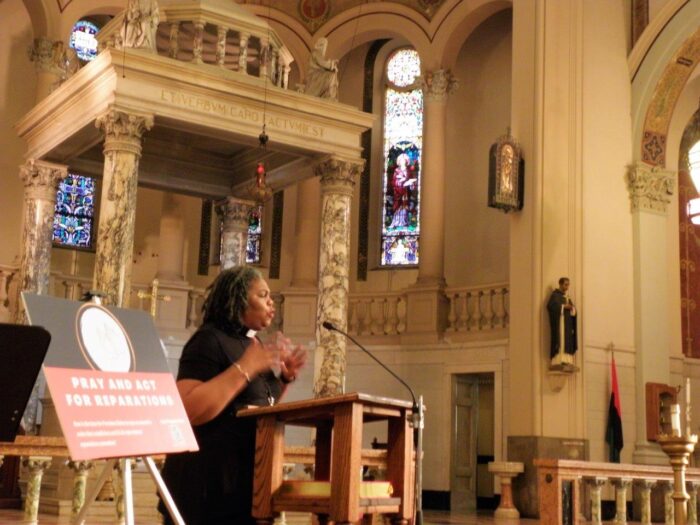
She recounted the 1865 promise of U.S. Gen. William Sherman to distribute 40-acre plots of formerly Confederate land to the formerly enslaved. “This plan represented the first systemic form of freedmen reparations,” she said — though the order was later rescinded and “the promise of reconstruction proved short-lived.”
And over the decades since, she said, Black people have experienced the opposite of reparations. “Segregation, redlining, the war on drugs, mass incarceration, racist policing over and over again, underfunded schools, minimum-wage jobs — all of these are iterations of the racism we have not dealt with as a people.
“And most of the time the conversations in the United States are directed at the people who have been aggrieved, instead of the people who have amassed wealth at the hands and the bodies and the sweat and the sacrifice of people whose generational capacity to take care of themselves has been attacked.”
An official study commission could help correct that, Blackmon said. “We’re asking for fairness in the conversation. Black Americans’ unemployment rate is more than twice that of white Americans’. Black families have just 1/16th of the wealth of white families.” Similar figures come into stark relief in U.S. cities, such as St. Louis, where Delmar Boulevard separates predominantly black neighborhoods from white. “There’s a 26-year life-span difference in the life of a white man on the south side of Delmar and the life of a Black man on the north side.
“This is not just about money. It is about saving lives, saving legacy, saving history, and, dare I say it, saving souls.”
Deprived of fair access
Organized by the Network, the Cleveland vigil featured T-shirt messages like “nuns against racism” and “Catholics for racial justice.” And it was filled with prayers for justice.
“More than 400 years of racist policies, laws and practices have deprived Black people of fair access to participation in our shared cultural, political, social, and economic life,” said Sister Eilis McCulloh, a Network grassroots mobilization fellow, at the start of the vigil. “The sinful legacy of white supremacy and the enduring racial wealth gap must not deny Black people good health, educational and economic outcomes any longer.
“Establishing a federal reparations commission in the United States is a central way that we name, understand and address our past and build anew. Now is the time.” The printed program listed a phone number and website where people could encourage Biden to sign an executive order by Juneteenth.
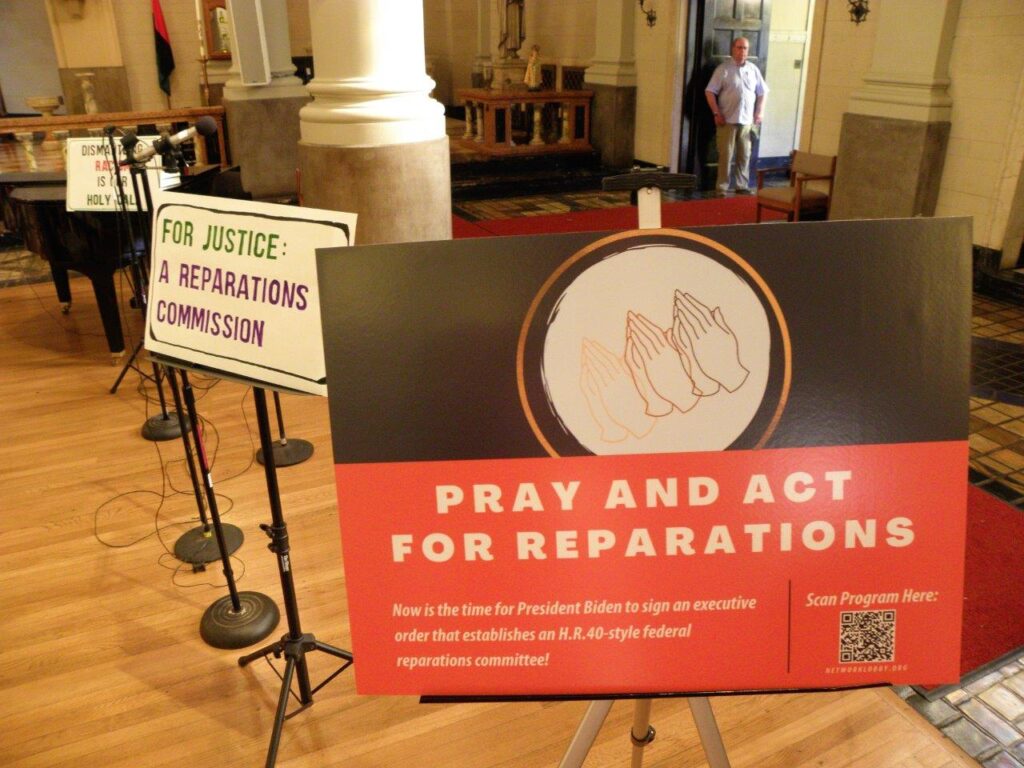
Repenting of sin
Humility was a theme, too. In a litany of prayers of petition, vigil participants asked for forgiveness for “times that I have”:
- “Not fully loved my neighbor as myself.”
- “Caused pain to others by my actions or words.”
- “Not done enough to educate myself and others about the sins of racism and its systemic nature.”
- “Allowed racism in my heart.”
- “Remained silent while witnessing another person or institution inflict racist harm on another.”
- “Failed to condemn discrimination.”
And they asked for “courage to commit ourselves to repair and redress for the legacy of racism in our city, our state and our country.”
“The truth is, these conversations must start exactly where you are starting — in the church,” Blackmon told the gathering. “For at the root, what we are dealing with is sin. And sin is what the church is called to address.”
“Unless this country reckons with its racism,” she said, “it will continue to be perpetuated from generation to generation to generation.”
“Reparations is about the church and the people and the society moving from charity to justice,” she concluded. “Moving from handout to hand up. Moving from simply offering to give someone a fish to giving them access to the lake so they can fish for themselves. It’s not what we are begging for. It’s the payment that we are due.”
Content on ucc.org is copyrighted by the National Setting of the United Church of Christ and may be only shared according to the guidelines outlined here.

Related News
Peace Be With You…
“…And also with you” is the response on Sunday mornings and on occasions where the peace...
Read MoreBreaking barriers and forging loving partnerships: Two servants of God are remembered
This Eastertide, the United Church of Christ remembers the Rev. Dr. Joan Brown Campbell and...
Read MoreGetting down and dirty in the soil: Rural congregation discovers ‘life has the last word’
The Rev. Julia L. Brown has a love/hate relationship with this time of year. “I dislike...
Read More
